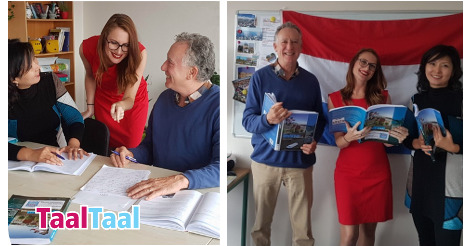Five Language Learning Tips for Busy People
If you're like most people, then you may find it challenging to find the time to work on your language learning outside of class. Yet, with the right strategies, you can learn to use your precious time effectively even if you have a busy schedule. Here are several effective language learning tips which are easy to integrate in your daily routine.
1. Leverage Technology to Your Advantage

Most course books nowadays have a digital portal with lots of extra exercises, in easy to digest small portions. You can ask your teacher for more details. This is easy to fit in between other tasks.
TaalTaal is also working on fun games, like the "de/het" game where you can practice articles in different languages: check out the game here.
Other things you can do is set the language of your phone or navigation system in the language you're trying to learn. Those usually use a limited set of words, so you can really focus on boosting highly practical vocabulary. You will pick up what "left" and "right" are in any language very quickly that way!
2. Make Use of Your Commute
For many, the daily commute is a period of lost time. You can use this time to expose yourself to podcasts or audiobooks in the target language. This works even if you're driving or walking. It can really help improve your listening skills and pronunciation. It helps turn idle time into an educational opportunity.
Don't forget that any form of daily exposure to the language is helpful. This is how native speakers learned the language after all.
3. Integrate Language Learning into Daily Activities
Incorporating language study and practice into your daily activities can make learning feel less like a chore and more like a natural part of your day. Watch movies or TV shows in the language you're learning, even if it means using subtitles at first. Label household items with their names in the target language to reinforce vocabulary. These small changes can significantly boost your language exposure without requiring extra time out of your day.
Again, it's important to have daily exposure to the language, even if it's just a few minutes.
4. Set Realistic Goals and Stick to a Routine
For busy people, setting realistic, achievable goals is crucial. Any progress is a gain and a personal victory, so learn to appreciate small steps. Instead of aiming for hours of study each day, commit to as little as 10-15 minutes. Consistency is important: even short daily sessions are more effective than sporadic, longer ones, for example when people do all of their homework on the day before their lesson.
Try to establish a routine by dedicating a specific time each day, whether it's first thing in the morning, during your lunch break, or before bed. A regular schedule helps create a habit, making it easier to stick to your goals.
5. Engage with a Language Learning Community
Joining a class at a place like TaalTaal gets you into contact with other like-minded people, who are probably struggling with exactly the same challenges. A school can offer an instant language community. TaalTaal offers free 'All-You-Can-Talk' sessions for extra practice, which can be very helpful. You may even use it for a while after your last paid class.Online forums, social media groups, language exchange meetups and colleagues and friends may offer a lot of opportunities to practice with native speakers, ask questions and share tips. Language is aimed at communicating with other people, and seeing how what you've learned translates into actually skills can be highly motivating. By actively trying to use the language, you will automatically become more interested in grammatical technicalities.o
As the saying goes, the journey of language learning is a marathon, not a sprint. If you're patient with yourself and appreciate the milestones, you are on a path where you can explore new cultures, opportunities and friendships.
Locatie en contact
U kunt ons per telefoon bereiken op 070-3226091 of per e-mail via info@taaltaal.nl - wij horen graag van u!Certificaat
U ontvangt na afloop van de cursus een certificaat met uw behaalde niveau. Hiervoor hanteren wij het gestandaardiseerde Europees Referentie Kader (ERK). Hiermee kunt u ook eenvoudig aansluiting vinden tussen verschillende instituten.Totaalpakket
Actueel Onderzoek
Als taleninstituut beschikt TaalTaal over haar eigen onderzoeksafdeling die speciaal is gericht op het ontwikkelen van vernieuwende methodieken zodat u de taal niet alleen intuïtiever aanleert, maar ook beter blijft onthouden en kunt verfijnen. Als TaalTaal-cursist profiteert u van een breed spectrum aan expertise en kennis.Cursus Nederlands | Cursus Spaans | Cursus Italiaans | Cursus Frans | Cursus Engels | Cursus Japans | Cursus Russisch | Kindercursusssen | Intensieve cursus Nederlands | Turbo Nederlands | Nederlands Onderdompeling | Veelgestelde Vragen (F.A.Q.) | TaalTaal Blog | Locaties | De/Het spel


